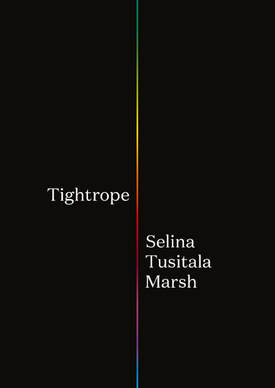
By Selina Tusitala Marsh
This book’s publication coincided with the author’s appointment as New Zealand Poet Laureate. The variety and breadth of the poems illustrate the skills behind both the collection and the appointment.
Marsh’s poetry styles include free verse illustrating Philippe Petit’s high-wire walk between New York’s Twin Towers:
if rain is
there or
not there
a cloudburst
would wash
away his life (‘Le Coup’, p 26)
and a take-off of e e cummings:
bloodgirl lived in a sleepy how town
(with up all few bird words down)
bloodgirl scrubbed her skin with their bones
carbon, dirt, diamond, stone (‘Gafatele’, p 28)
‘Eviction Notice 113’ leaves the printed page almost entirely out of the poetry story, relying on rapid sounds alone:
a body a part her body’s become a body apart her body’s become a body a
part party party party party party party party party t t t t t t t t t t t t t t t t t t (p 63)
Twenty pages of blackout poetry serve as a gloss to Albert Wendt’s novel Pouliuli. These poems, like the novel, address that blackness that invades the human spirit according to its own schedule. It’s not an existential nothingness – rather, dark to the nth degree, a miltonic too-much-ness rather than nothingness. Blackout poetry – sometimes called redacted poetry – involves blacking out a page of text, leaving only a few scattered words to serve as a new poem. Such poems are often unsuccessful because they don’t properly address the underlying text and seem irrelevant to it. Marsh’s poems, however, appear on pages of Wendt’s novel – an ingenious and successful way of using blackness to illustrate blackness.
Many of the poems address other people: ‘Essential Oils for the Dying’ is a lament for Teresia Teaiwa, to whom the book is dedicated. Other poems centre on the author’s attendance at 2016’s Commonwealth Observance Day – gone to London to visit the Queen, where in an auxiliary poem ‘Pussy Cat’ shows off:
My moana blue Mena
My Plantation House shawl
My paua orb
My Niu Ziland drawl
my siva Samoa hands
My Blood red lips
My Va philosophising (p 41)
So where is the tightrope taking us? It takes us over the Abyss, from Uncle Siva’s squabbling dogs to the formality of Westminster Abbey to a windswept Hawaiʻian outcrop – not so much step by cautious step like Petit but with the speed of imagination and the balance of consideration.
It’s a wide-ranging collection – interesting for both the varied styles and the varied scenery. Some of the poems make me wonder, why write them down at all? Paper is too thick, too durable for some ways of talking. But should we worry about where we will end up? Probably not. As the last blackout poem (p 99) puts it:
never
wound a
new
bird
Author: Selina Tusitala Marsh
Publisher: Auckland University Press
ISBN: 9781869408725
RRP: $27.99
Available: bookshops

 RSS Feed
RSS Feed
